Top 11 Best Ecommerce Platforms In 2023
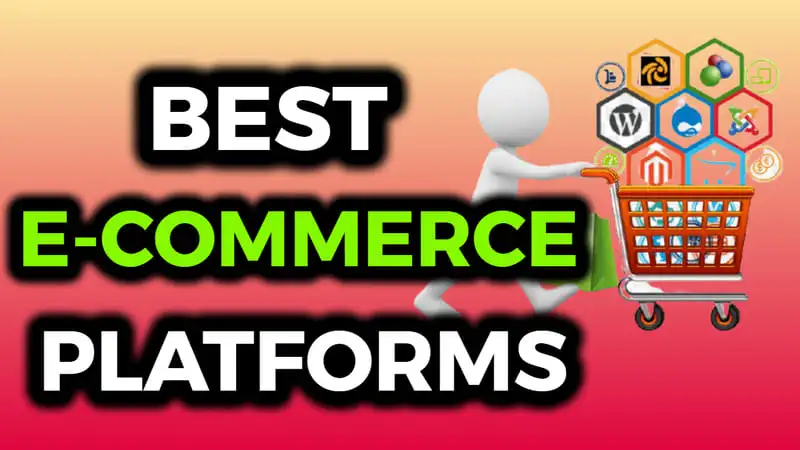
If you want to make job replacing income and want to work online from the comfort of your home or anywhere in the world
Take a look at this - Live Chat Jobs
In just a few years, online retail has gone from being a small platform to one of the biggest retailers in the world. In fact, it’s now bigger than traditional brick-and-mortar stores as more people turn to technology for shopping. Many companies have also already adopted eCommerce as their main method of selling products and services to consumers.
Ecommerce is a booming industry and it’s only going to grow. In fact, we’re now seeing the early stages of the eCommerce revolution and what that will look like in the future.
With great change comes new opportunities and challenges. Ecommerce platforms have evolved in recent years by incorporating more features into their existing system or introducing them in a brand new form altogether. This will be an important one for the eCommerce industry as it will determine which platforms will reign supreme in the years to come.
But what are the best eCommerce platforms? Let’s have a look at some of the top eCommerce sites being used today and their features.
Here are some of the Best Ecommerce Platforms for selling products online
1. BigCommerce

What makes BigCommerce an excellent eCommerce platform is how it allows businesses to build their own branded online storefront, easily manage sales and inventory, integrate shopping carts, newsletters, payment gateways, shipping rates, etc.
They provide top Seo capabilities, 50+ transaction methods, sophisticated product selections, 24/7 customer support, and can expand with your eCommerce business which does millions in annual revenue.
BigCommerce makes it simple to create attractive eCommerce sites and sell on social networking sites such as Facebook and Instagram, as well as sites such as Amazon and eBay.
BigCommerce offers two product lines: BigCommerce enterprise and BigCommerce Essentials, their entry-level product. Both are meant to expand with your business. You also get quite a big set of features like automated shipping, SEO tools, and A/B testing for free.
BigCommerce includes advanced reporting and analytics with each and every plan. Users may go deeper and build custom reports on profitability, consumer habits, order details, and more, in addition to accessing real-time data on purchases, and conversions.
BigCommerce Pricing page
- Standard: $29.95/month;
- Plus: $79.95/month, or $71.95/month when paid annually;
- Pro: $299.95/month, or $269.96/month when paid annually;
- Enterprise custom pricing.
They also offer a 15-day free trial with all BigCommerce plans.
2. Shopify

Shopify is another great platform for new online stores, with all the necessary resources to help you get your business up and running. Over the past few years, they’ve built a strong customer base all over the world with their reliable features and helpful support team. Shopify is a global eCommerce giant with over 500,000 customers. When you think about eCommerce, Shopify might be the first thing that comes to mind.
Shopify features an integrated payment processor and advanced fraud protection. You can accept credit cards and PayPal on your Shopify store, giving you the option to choose both processor options for improved rates and security.
Shopify also offers a wide range of eCommerce solutions: online stores, pop-ups, mobile stores, and physical storefronts. Shopify is compatible with over 100 apps that help you run your business. Their mobile commerce capabilities are a great option for retailers who want to attract more mobile shoppers.
Shopify is a terrific alternative for businesses that do not have much technical knowledge, it’s an all-in-one eCommerce platform that’s simple to set up and run.
Shopify offers users three different plans to choose from, based on the amount of traffic you expect to receive each month.
They are as follows: Basic Shopify plan is perfect for selling under 30 items per month.
The Shopify plan provides everything found in the Basic plan, as well as unlimited products, 2% transaction fee, and abandoned cart recovery;
The Advanced Shopify plan is designed for businesses that are expecting more than 500,000 visits per month and offers a 0.5% transaction fee, 1GB of storage per month, and professional reports.
Shopify Pricing page
- Basic Shopify: $9/month (billed annually);
- Shopify: $29/month (billed annually), or $39/month;
- Advanced Shopify: $79/month (billed annually), or $99/month.
Apart from the three plans listed above, Shopify also offers a 14-day free trial for you to try their service without having to pay.
3. Big Cartel
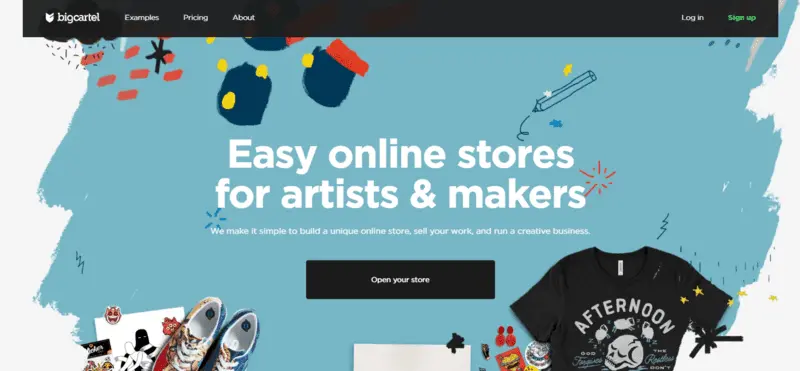
The BigCartel platform is a great choice for those who are looking to make a statement online with their eCommerce presence, without having to jump through too many hoops in order to get started using the service.
This website builder offers a wide selection of customizable templates and a user-friendly drag-and-drop interface. You can also use Big Cartel to sell products on social media platforms and other popular eCommerce sites.
Big Cartel is perfect for artists, small businesses, and makers who want to start selling online without a lot of hassle. They offer a flat monthly rate for all their plans, which makes it easy to budget for your eCommerce business.
There are five different Big Cartel plans to choose from, each with its own set of features. You can however take advantage of Big Cartel to sell products on social media sites and various popular sites too.
BigCartel Pricing Page
- 5 products: free;
- 50 products: $9.99/month;
- 250 products: $19.99/month;
- 500 products: $29.99/month
4. SquareSpace

Squarespace is another all-in-one platform that’s perfect for small businesses and online stores. They offer a wide range of templates to choose from, making it easy to get started with your online store.
One thing that makes Squarespace a great option for some business owners is that they offer a 14-day free trial without having to provide a credit card.
Squarespace is straightforward for anyone with no technical skills to construct a website, but you miss out on function and SEO advantages in exchange.
It’s incredibly easy to set up with Squarespace, and you receive some awesome mobile-friendly layouts, product management, and shipping service compatibility.
Users can rapidly inspect and order supplies, process and dispatch orders, and gain useful insights into site traffic, market trend, and customer information using Squarespace’s easy-to-use interface.
You can also use Squarespace to sell products on social media platforms like Facebook Instagram etc
SquareSpace Pricing Page
- Personal: $8 per month;
- Business: $18 per month;
- Basic: $26 per month;
- Advanced: $40 per month.
5. Wix

Wix is another platform that offers a wide variety of templates to choose from, making it easy for anyone to get started with eCommerce.
In addition, Wix also offers a free plan so you can try out their service before you commit to using it.
Wix has some great features, including an easy-to-use drag-and-drop interface, the ability to create a professional website without any coding skills, and access to Wix’s huge library of templates.
Merchants may track orders, make online payments, offer products across different channels, and run abandoned cart advertisements using the platform.
However, there are some downsides to using Wix. For example, their eCommerce features are not as comprehensive as other platforms like Shopify and Big Cartel.
Wix is a wonderful solution for small online businesses because of the variety of eCommerce capabilities you get for the price.
Wix Pricing Page
- Business Basic: $23/month;
- Business Unlimited: $27/month;
- Business VIP: $49/month.
6. WooCommerce
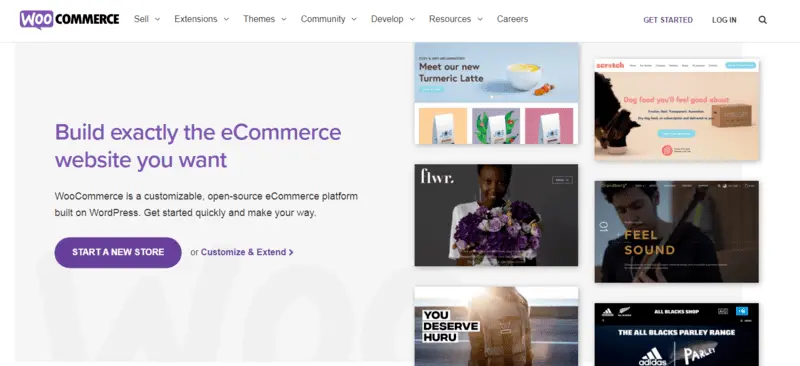
The WooCommerce platform is a great choice for businesses that are looking for a more affordable option when it comes to setting up an eCommerce store. This plugin is available as a free download on the WordPress website, making it a popular choice for small business owners.
In addition, WooCommerce also has a huge community of developers who are constantly creating new plugins and themes for the platform. This makes it easy to find help and support if you need it.
WooCommerce is a very versatile platform that can be used for a wide variety of businesses. It’s perfect for businesses that are just starting out because it’s free.
WooCommerce is also known for offering some of the best documentation out there that will help you set up your online store if you’re struggling with any aspect.
WooCommerce Pricing Page
The plugin itself is absolutely free;
While WooCommerce is free to use, some of the more beneficial addons can cost upwards of $350.
There re no trial but provides a 30-day money-back guarantee
7. Prestashop
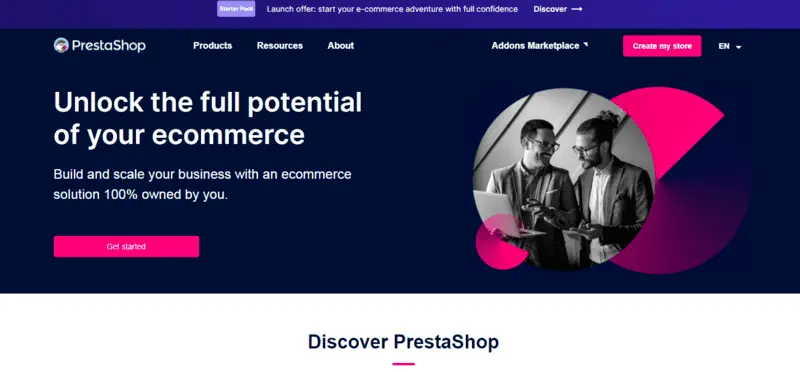
Prestashop is an open-source platform that is popular with small businesses and entrepreneurs. It’s free to download and use, making it a cost-effective option for those who are just starting out. PrestaShop users perform a lot of troubleshooting individually with the support of the community because there is no built-in customer service.
In addition, Prestashop also offers a wide variety of features, including the ability to create a professional website without any coding skills, access to a huge library of templates, and the ability to sell products across multiple channels.
Users can track orders, make online payments, offer products across different channels, and run abandoned cart advertisements using the platform.
One disadvantage to using Prestashop is that it’s not as easy for beginners to use compared with other platforms like Shopify and Wix.
Prestashop is a great platform for businesses that are looking for a more affordable option when it comes to setting up an eCommerce store.
Prestashop Pricing Page
- The software is free;
- Professional and premium themes can range from $50 to $200;
- Extensions can range from $10 to $400.
8. Weebly

The Weebly platform is another great option for businesses that are looking for a cost-effective way to create an eCommerce store. Like Wix, it offers customers access to over 750 different templates that can be used to build a professional website without any knowledge of coding.
Users who opt for the premium plan also have access to additional features, such as the ability to sell products across different channels, the ability to track orders and make online payments, and the ability to run abandoned cart advertisements.
Weebly is a great platform for businesses that are just starting out because it’s free to use.
Weebly’s platform doesn’t require any technical knowledge to use, however it just has a very minimal online store.
Weebly Pricing Page
- Free Plan – $0 per month
- Personal Plan – $6 per month
- Professional Plan – $12 per month
- Performance Plan – $26 per month
9. Zyro

The Zyro platform is a great choice for businesses that are looking for an eCommerce platform that offers a lot of flexibility. It’s perfect for businesses that are looking to create a custom eCommerce store because it gives users the ability to customise their store’s design, functionality, and checkout process.
In addition, Zyro also offers users a wide variety of features, including the ability to sell things through various platforms, obtain a large template library, and built-in SEO optimization.
Zyro is a great platform for businesses that are looking for more design customization options compared with other platforms like Weebly and Wix.
Zyro is a great platform for businesses that are looking to build an online store with features like advanced SEO optimization and custom designs.
Zyro Pricing Page
- Unleashed Plan – $2.90 per month
- eCommerce Plan – $8.90 per month
- eCommerce Plus Plan – $15.90 per month
10. Sellfy
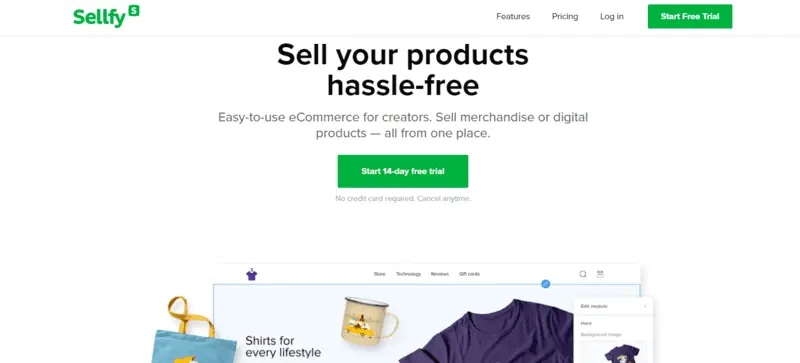
Sellfy is an eCommerce platform that is best for individuals who are looking to sell digital products, such as photos, videos, music, and software. Sellfy users have the ability to set up a website of their own or use one of the many templates that Sellfy provides.
The platform also gives users access to features like the possibility to monitor orders and pay for them online, and the ability to run abandoned cart advertisements.
Sellfy is perfect for bloggers, creators, and small businesses wishing to sell digital products, memberships, and physical goods through their website, via social media profiles. It has a user-friendly interface and the potential to have your site up and running in minutes.
Sellfy is a great choice for businesses that are looking for an eCommerce platform that specialises in selling digital products.
Sellfy Pricing Page
- Starter Plan – $19 per month
- Business Plan – $39 per month
- Premium Plan – $89 per month
11. Volusion

Volusion is a great platform for businesses that are looking to start selling online and have a little bit of technical knowledge. They offer users a wide selection of templates to choose from, making it easy to create a professional website without any coding experience.
In addition, Volusion also offers users a variety of features, such as the flexibility to sell goods on a variety of platforms, amass a huge template library, and built-in SEO optimization.
When compared to other services like Weebly and Wix, Volusion is ideal for businesses looking for greater design tweaking choices. Volusion’s platform also requires users to be slightly tech-savvy because they aren’t as user-friendly as platforms like Shopify or Squarespace.
One of the advantages of a Volusion site is that it has an in-house SEO and branding team which can assist with internet advertising and search engine rankings.
Volusion Pricing Page
- Personal Plan – $29 per month
- Professional Plan – $79 per month
- Business Plan – $299 per month
They provide a 14-day free trial too.
FAQs for Best Ecommerce Platforms
Q.What is the most SEO-friendly eCommerce platform?
A.Shopify and Bigcommerce are the most SEO-friendly platforms because they have built-in SEO optimization and they provide a good URL structure for search engines.
Q.What eCommerce platform provides the best payment options?
A.Squarespace provides users with many different payment options, including Apple Pay, PayPal, and Amazon Pay.
Q.What is the most user-friendly eCommerce platform?
A.Shopify and Squarespace are the most user-friendly platforms because they are drag and drop builders, which makes it easy for anyone to create a website without any coding experience.
Q.What Are the Best Ecommerce Platforms for Small Businesses?
A.Shopify, Bigcommerce, are the best eCommerce platforms for small businesses because they offer affordable pricing plans for small online stores, in addition to providing users with many tools that help their business succeed.
Q.What Are the Best Dropshipping Ecommerce Platforms?
A.Shopify, Bigcommerce, and Bigcartel are the best dropshipping platforms because they offer users a wide variety of apps and integrations that make it easy to connect to suppliers and automate the dropshipping process. Additionally, both platforms have very user-friendly dashboards that make running a dropshipping business simple.
Q.What Are the Advantages of Using an Ecommerce Platform?
A.There are many advantages to using an eCommerce platform. They offer lots of support, in addition to giving users access to various apps and integrations that can help in running a successful online store.
In Conclusion
With so many different eCommerce platforms to choose from, it can be difficult to know which one is best for your business. We’ve highlighted the details of some popular options in order to help you make an informed decision about what platform would work well with your product offerings and style preferences.
For example, if you want a drag-and-drop builder that offers lots of design tweaking choices but requires slightly technical knowledge, then Shopify might be right for you.
On the other hand, if you need more app integrations or built-in SEO optimization then BigCommerce might be better suited for your needs. Whatever option suits your needs best, we hope this article has helped you in making your decision!





